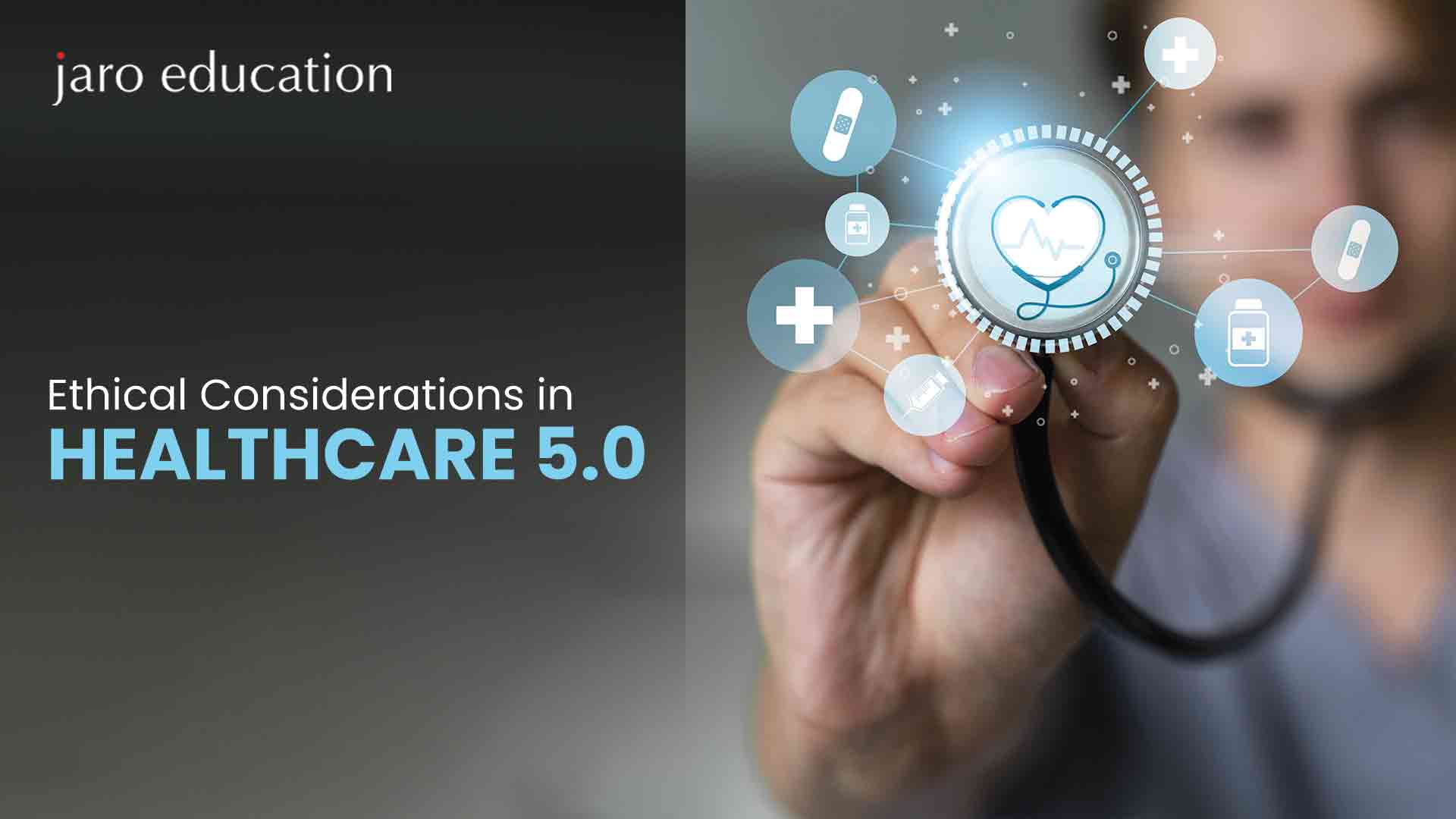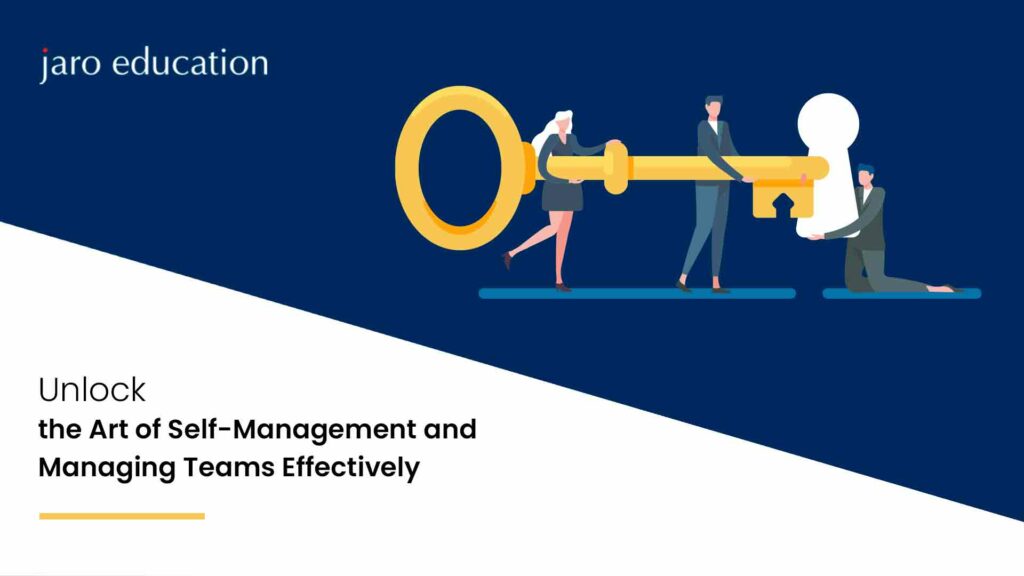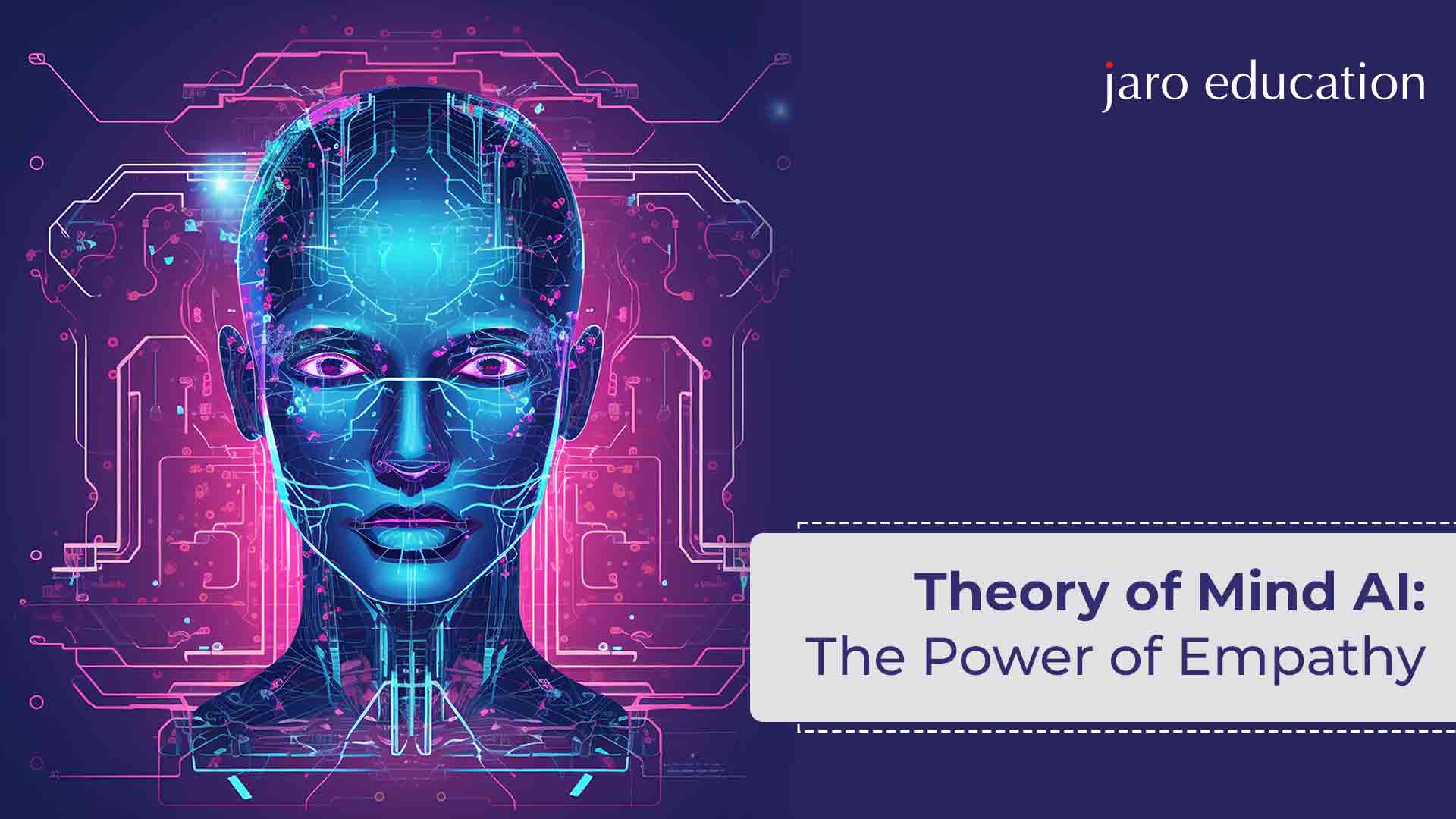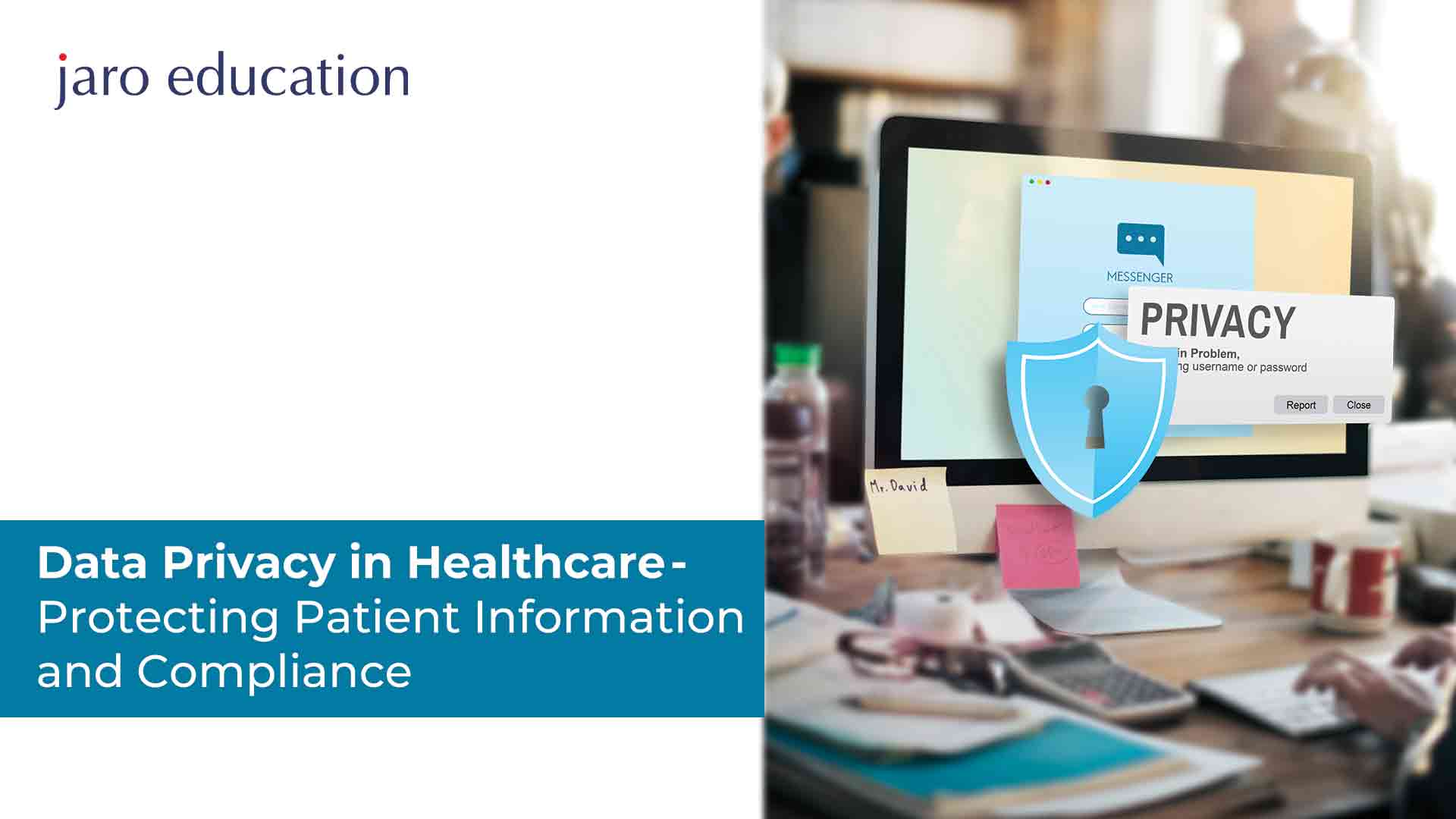Ethical Considerations in Healthcare 5.0: Balancing Innovation with Patient Care
Table of Contents

- jaro education
- 26, May 2024
- 4:55 pm
Ethical Considerations are a must where innovation in healthcare is concerned. In the rapidly evolving landscape of healthcare, the advent of Industry 5.0 represents a seismic shift, where the fusion of technology and human-centered design heralds a new era of patient-centric care. As professionals navigating this transformative journey, it’s imperative to comprehend and address the ethical considerations inherent in Healthcare 5.0.
This blog endeavors to dissect the intricate interplay between innovation in healthcare, patient welfare, and ethical considerations within the context of Industry 5.0, underscoring the pivotal role of ethical leadership and conscientious technological integration. Through the prism of the Executive Programme in Healthcare for Industry 5.0 by CEP, IIT Delhi, we shall delve into the multifaceted dimensions of ethical considerations in healthcare and their convergence with groundbreaking innovations.
The Technological Revolution
Industry 5.0 epitomizes a paradigm shift in healthcare, transcending the mechanistic frameworks of Industry 4.0 to embrace a symbiotic relationship between humanity and technology. Unlike its predecessors, Industry 5.0 advocates for the harmonious collaboration between humans and machines, acknowledging the irreplaceable role of human empathy and intuition in healthcare delivery. This metamorphosis extends beyond technological adoption; it necessitates a fundamental reimagining of our approach toward leveraging technology to optimize patient outcomes.
The Executive Programme in Healthcare for Industry 5.0 stands as a beacon, equipping professionals with the requisite acumen to navigate this evolutionary juncture. By fostering a deep understanding of Industry 5.0 principles and their implications for healthcare, the programme empowers participants to spearhead transformation in ethical considerations amidst the rapid evolution of healthcare technology.
Statistics and Growth Potential
The statistics paint a vivid portrait of the burgeoning healthtech market in India, poised to burgeon into a $25 billion behemoth by 2025, according to a report by The Hindu. This meteoric rise, propelled by burgeoning internet penetration and the escalating prevalence of chronic ailments, underscores the immense potential for innovation in healthcare. Yet, this exponential growth mandates a commensurate commitment to ethical stewardship, ensuring that technological advancements are harnessed judiciously and inclusively where ethical considerations are concerned.
Delineating Industry 4.0 from Industry 5.0 unveils a pivotal transition from automation-centric paradigms to human-centric design philosophies. This evolution underscores the imperative of infusing technological advancements with empathy and inclusivity, fostering innovations that resonate with the diverse needs of patients and healthcare providers, and always keeping ethical considerations in mind.
Understanding Ethical Considerations in Healthcare 5.0
As we embark on the journey through Healthcare 5.0, it’s imperative to delve deep into the ethical considerations that underpin the integration of advanced technologies such as AI, robotics, and augmented reality into healthcare delivery. These technologies hold immense promise in revolutionizing patient care, yet their implementation raises profound questions regarding ethical considerations and confidentiality in healthcare.
Exploring the Ethical Implications of Advanced Technologies
The integration of AI, robotics, and augmented reality in healthcare introduces a myriad of ethical considerations that warrant thorough examination. AI-driven diagnostics, for instance, offer unprecedented accuracy and efficiency in identifying medical conditions, yet they also raise concerns regarding algorithmic biases and transparency. It’s crucial to scrutinize these algorithms rigorously to ensure equitable treatment across diverse patient populations and mitigate the risk of perpetuating existing disparities in healthcare delivery.
Similarly, the deployment of robotics in surgical procedures presents dilemmas in ethical considerations concerning patient safety and autonomy. While robotic-assisted surgeries promise enhanced precision and reduced recovery times, they also prompt questions about the delegation of decision-making authority to autonomous systems and the potential erosion of the physician-patient relationship. Striking a balance between leveraging technology to augment surgical outcomes and preserving the fundamental principles of patient-centered care requires meticulous ethical deliberation.
Augmented reality (AR) offers yet another dimension to the ethical discourse in Healthcare 5.0, particularly in the realm of medical education and training. While AR simulations empower medical students to engage in immersive learning experiences and hone their clinical skills, they also necessitate careful consideration of patient consent and privacy. Ensuring that patient data used in AR simulations is anonymized and sourced with ethical considerations in mind is paramount to upholding patient trust and confidentiality in healthcare.

Importance of Maintaining Patient Privacy, Data Security, and Informed Consent
In the era of Industry 5.0, where data serves as the lifeblood of innovation of healthcare, safeguarding patient privacy and data security emerges as non-negotiable imperatives. The proliferation of electronic health records and interconnected medical devices necessitates robust safeguards to protect sensitive patient information from unauthorized access and exploitation.
Moreover, as healthcare organizations increasingly leverage data analytics and machine learning algorithms to derive actionable insights from patient data, it’s imperative to uphold the principles of informed consent and transparency. Patients must be adequately informed about how their data will be used and have the autonomy to consent to its utilization for research or treatment purposes. Establishing clear guidelines for data governance and consent processes fosters trust between patients and healthcare providers, laying the foundation for ethical considerations regarding data practices in Healthcare 5.0.
Delving into the Challenges of Ensuring Equitable Access
The pursuit of innovation in healthcare must be accompanied by a steadfast commitment to ensuring equitable access to innovative solutions for all patient populations. However, achieving this goal in the era of Industry 5.0 poses significant challenges, particularly in the face of socio-economic disparities and systemic inequities in healthcare delivery.
For instance, while cutting-edge medical technologies may be readily accessible to affluent urban populations, rural and underserved communities often face barriers to accessing these innovations. Addressing this disparity requires a multi-pronged approach that encompasses not only technological affordability but also infrastructure development, healthcare workforce capacity-building, and community engagement.
Moreover, the equitable distribution of healthcare resources necessitates a nuanced understanding of socio-economic determinants of health and a commitment to addressing systemic inequities. Healthcare organizations must collaborate with policymakers, community leaders, and advocacy groups to design interventions that bridge the gap between privilege and vulnerability, ensuring that Healthcare 5.0 serves as a catalyst for inclusive and accessible healthcare delivery.
Striking a Balance Between Innovation and Patient Care
In the dynamic landscape of Healthcare 5.0, the pursuit of innovation often intersects with the fundamental imperative of patient care, giving rise to intricate ethical dilemmas. Section 2 elucidates the delicate balance between fostering innovation in healthcare and upholding the paramountcy of patient welfare, underscoring the need for strategic approaches to navigate these complexities effectively.
Highlighting Potential Conflicts
The drive for innovation in healthcare may sometimes engender conflicts with the primary goal of patient care, posing ethical quandaries that demand careful consideration. For instance, the rapid adoption of new medical technologies and treatment modalities may inadvertently prioritize novelty over evidence-based practice, potentially compromising patient safety and efficacy. Striking a balance between embracing innovation in healthcare and adhering to established standards of care requires vigilance and discernment.
Moreover, the commodification of innovation in healthcare may exacerbate disparities in access and affordability, marginalizing vulnerable populations and undermining the principles of distributive justice. As healthcare organizations seek to capitalize on novel technologies and treatment modalities, they must remain cognizant of their ethical responsibilities to ensure equitable access and patient-centered care.
Discussing Strategies for Mitigating Ethical Concerns
Effectively mitigating ethical concerns while fostering innovation necessitates the implementation of robust strategies grounded in interdisciplinary collaboration and regulatory frameworks. Interdisciplinary collaboration serves as a linchpin for ethical innovation, fostering dialogue and synergy among diverse stakeholders to address complex healthcare challenges comprehensively.
By fostering collaboration between clinicians, technologists, ethicists, and policymakers, healthcare organizations can leverage diverse perspectives to identify and address ethical blind spots in innovation processes. This interdisciplinary approach fosters a culture of ethical reflection and accountability, ensuring that innovation aligns with the imperatives of patient welfare and societal benefit.
Furthermore, robust regulatory frameworks play a pivotal role in safeguarding patient interests and promoting responsible innovation. By establishing clear guidelines for the ethical development and deployment of healthcare technologies, regulatory bodies mitigate risks and ensure accountability throughout the innovation lifecycle. These frameworks encompass rigorous testing and evaluation protocols, transparent reporting mechanisms, and mechanisms for addressing adverse events and breaches where ethical considerations are concerned.
Emphasizing the Importance of Continuous Education and Training
Continuous education and training serve as catalysts for fostering ethical leadership and promoting a culture of accountability within the healthcare industry. The Executive Programme in Healthcare for Industry 5.0, offered by CEP, IIT Delhi, exemplifies this commitment to professional development and ethical excellence.
Through comprehensive coursework and experiential learning opportunities, the Executive Programme equips healthcare professionals with the knowledge, skills, and ethical framework needed to navigate the complexities of Healthcare 5.0 with integrity and efficacy. Participants gain insights into cutting-edge technologies like big data in healthcare, ethical decision-making frameworks, and regulatory best practices, empowering them to lead ethically in an era of rapid innovation.
Moreover, the Executive Programme cultivates a community of ethical leaders who are committed to upholding the highest standards of patient care and societal responsibility. By fostering a culture of continuous learning and a reflection on ethical considerations, the programme ensures that healthcare professionals remain abreast of emerging trends, ethical dilemmas, and best practices in Healthcare 5.0.
Integrating Industry 5.0 Principles with Ethical Practice
In the realm of Healthcare 5.0, technology transcends its status as a mere tool; it emerges as a conduit for fostering patient-centricity and optimizing healthcare delivery. Through the lens of human-centered design and ethical decision-making, professionals orchestrate a harmonious integration of technology and empathy, ensuring that patient well-being remains paramount.
The executive programme furnishes participants with a comprehensive toolkit, encompassing a diverse array of topics ranging from human physiology to engineering for healthcare and risk management. Armed with these insights, professionals navigate the ethical nuances of Healthcare 5.0 with sagacity, effectuating a seamless fusion of Industry 5.0 principles with ethical considerations regarding healthcare practices.
To conclude, ethical considerations constitute the cornerstone of Healthcare 5.0, guiding professionals as they navigate the terrain of technological innovation. Through initiatives like the Executive Programme in Healthcare for Industry 5.0, professionals emerge as torchbearers of integrity when it comes to ethical considerations, ensuring that innovation remains steadfastly aligned with the imperatives of patient welfare. As we chart the trajectory of Healthcare 5.0, let us remain cognizant of the pivotal role played by leadership in ethical considerations in shaping a future where innovation and patient care coalesce seamlessly.
Extending a fervent call to healthcare professionals to embark on the transformative journey offered by the Executive Programme in Healthcare for Industry 5.0 by CEP, IIT Delhi. Together, let us continue the discourse on ethical considerations in Healthcare 5.0 and leverage our collective insights to forge a future where innovation and patient welfare converge harmoniously under the aegis of ethical excellence.












